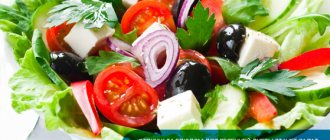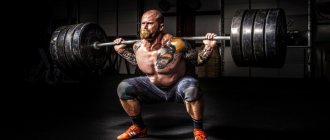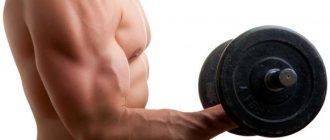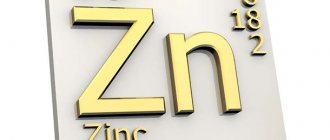Nutritional composition of cottage cheese
The nutritional composition of different types of cottage cheese varies depending on the fat content of the milk used in its preparation and the amount of sodium added.
For example, let's take low-fat cottage cheese:
| Nutritional composition of low-fat cottage cheese (1%) | |
| Calories | 71 Cal |
| Protein | 16 g |
| Carbohydrates | 3 |
| Fats | 1 |
| Vitamins and minerals | Phosphorus, sodium, selenium, vitamins B12, B3, B6, A, riboflavin, calcium, folate, iron, magnesium, potassium, zinc and copper |
For gaining muscle mass, what matters most is the protein content in cottage cheese.
Please note that it is quite a lot: a 200 gram serving of cottage cheese is equivalent to a protein shake (~30 grams of protein). And at the same time, it is much cheaper (about 2 times when converted to the same amount of protein).
Cottage cheese protein is complete, i.e. contains all essential amino acids, and is “slow” (digested within 4-6 hours). Both properties are important for stimulating muscle growth.
It also contains many microelements: B vitamins, calcium, phosphorus and selenium.
Vitamin B12
The product is rich in vitamin B12, which determines the development and functioning of brain cells, nervous system, and blood cells. Its sufficient presence in the diet is especially important for children.
Vitamin B12 deficiency is very common among vegans, whose diet is completely free of animal products.
A 200 g serving of cottage cheese contains approximately a quarter of the daily value of vitamin B12
We recommend : Vegetarianism/veganism and sports: benefits and RISKS
Selenium
A 200 g serving of cottage cheese contains on average 30% of the daily value of selenium. Selenium has powerful antioxidant effects 17 and its deficiency is a factor in the development of cancer, cardiovascular disease and nerve cell degeneration.
Cottage cheese contains high-quality “slow” protein casein and important microelements, including vitamin B12, selenium, calcium and phosphorus
The benefits of cottage cheese for weight loss
Cottage cheese is included in the diet on many weight loss diets (in particular the Dukan protein diet).
Numerous studies have proven that eating protein-rich foods (such as cottage cheese) is beneficial for weight loss. This is due to several reasons:
- Cottage cheese increases the feeling of fullness and significantly reduces the number of calories eaten in subsequent meals 2,3,5.
The same satiety effect is seen with eggs, which have been shown to be beneficial for weight loss.
- Protein foods have increased thermogenic effects: their digestion requires approximately 30% more energy than fats and carbohydrates; this means that the number of calories that can be stored as fat 4 is reduced.
- Calcium , contained in cottage cheese in large quantities, is related not only to bone strength, but is an independent factor useful for weight loss 7.8.
It plays a key role in energy metabolism: it prevents the increase in fat stores when excess calories are consumed, and also accelerates fat burning under conditions of calorie restriction.
- Cottage cheese is good for muscle growth (which will be discussed below) and when consumed (especially in combination with training), energy redistribution : more energy is directed to the construction of muscle tissue, which means less is stored in fat.
In one study, scientists decided to find out how changing eating habits (increasing the proportion of protein and reducing carbohydrates) would affect the weight of obese people 18.
The experiment involved 30 men and 30 women aged ~50 years. Typical food products of modern man were excluded from the diet (pasta, packaged fruit and vegetable juices, potatoes, cheeses, sugar, meat, lard, butter) and the proportion of protein products (cottage cheese, fish), wholemeal bread, cereals, and rice was increased. , vegetables, fruits and vegetable oils.
As a result, after a year, the participants lost from 2 to 9 kg (women) and from 1 to 5 kg for men. Blood cholesterol levels also decreased significantly and blood pressure normalized.
Share with us your experience of losing weight, using sports nutrition or pharmacology!
Cottage cheese is a source of high-quality protein and calcium, which are beneficial factors for weight loss
We recommend : Is protein good for weight loss?
How much cottage cheese do you need for muscle growth?
Turnikman, for muscle growth it is enough to eat 300-400 grams daily. Divide this figure into 2-3 doses: 100g before exercise and 200 after. Make a menu that includes: milk, kefir, cottage cheese, fruits, eggs. Eat carbohydrate-containing foods before going to the gym, and protein foods after.
ADVICE FROM THE INSTRUCTOR
To save time, athletes use the following cocktail recipe: mix cottage cheese with water and sugar (you can use jam, honey, banana) and drink it in one gulp. When 5 packs are eaten per day, this method is very acceptable.
The benefits of cottage cheese for gaining muscle mass
Cottage cheese in bodybuilding is one of the best natural protein sources.
It has long been proven that a diet high in protein in combination with strength training is beneficial for gaining muscle mass 6.
The benefits of cottage cheese for gaining weight are explained mainly by a special type of protein - casein - which it contains in fairly large quantities.
Casein is a “slow” protein and takes longer to digest and absorb than another milk protein, whey protein.
Casein is just as effective as whey protein for building muscle mass, but its advantage is that it better protects against muscle catabolism by providing a slow and continuous supply of amino acids to the muscles over a period of 10 hours.
Some scientific facts about the benefits of casein (cottage cheese) for gaining weight:
- In Experiment 10, scientists studied the effects of casein and whey protein on the rate of muscle synthesis. They found that after consuming whey protein immediately after exercise, blood levels of insulin and bcaa amino acids increased much more than for casein, but the rate of muscle protein synthesis was approximately the same and increased over the course of 1-6 hours.
- Experiment 11 showed that casein was 34% more protective of muscle breakdown than whey protein, but whey was twice as effective at stimulating muscle protein.
- In mouse studies, dairy proteins (whey, casein, milk) have been shown to have significantly greater potential for stimulating muscle growth than soy protein; It was also noted that the moment of reaching peak speed is different for different types of protein: whey protein - 60 minutes after consumption, milk protein - 90 minutes, casein - 120 minutes 9.
- Of particular importance for muscle growth is the slow and uniform flow into the blood of the amino acid leucine - one of the three BCAA - which has a strong anabolic effect: within 7 hours after intake, the level of leucine is higher than for whey, but after taking whey protein, a greater percentage of leucine is oxidized 11 -13.
In bodybuilding, cottage cheese (or sports casein) is most often recommended to be consumed before bed - this provides constant nutrition to the muscles during night recovery and protects against muscle catabolism. See How to take protein to gain muscle mass.
The benefits of cottage cheese for gaining muscle mass are explained by its fairly high content of casein, a slow protein that has anti-catabolic effects.
We recommend : How much protein should you drink per day to gain muscle mass?
What to eat cottage cheese with after training
Cottage cheese goes well with fresh berries and fruits. You can simply add and mix them, or you can beat them with a blender into an airy mass. An excellent option is with prunes, dried apricots and raisins, which enrich the diet with microelements. For those who prefer a spicier option, experts recommend adding herbs - dill, parsley, cilantro, basil. During active training during this particular period, you can add a little honey.
From time to time you can treat yourself to cheesecakes or casserole, but you should remember that long-term heat treatment causes casein to lose its specific properties.
Other beneficial properties of cottage cheese
- Stabilization of insulin levels
Insulin resistance leads to the development of type 2 diabetes and cardiovascular disease.
Most often, the reason for its formation is the regular consumption of simple carbohydrates (sugar).
Calcium, which cottage cheese is rich in, has a stabilizing effect on insulin 7. Scientists say that regular consumption of cottage cheese and other dairy products reduces the risk of developing diabetes by 21% 14.
- Cottage cheese is good for bone health
In addition to calcium and protein, cottage cheese contains a lot of phosphorus. All three elements determine bone health 15,16.
If you think what we do is important, support our project!
YES!
- Cottage cheese helps detoxify the body
The function of phosphorus is not limited to making bones stronger. It also regulates acidity levels in the body.
Phosphorus is the second most abundant mineral in the body (after calcium); this indirectly speaks of the importance of the functions it performs. One of them is the elimination of toxins (it helps the kidneys do their job) 19.
- Cottage cheese helps achieve a state of ketosis
Ketosis is the goal of the ketogenic diet. This is a condition in which the body uses fats as an energy source rather than carbohydrates.
Scientists report numerous health benefits, including weight loss and cancer treatment, and recommend this diet for the vast majority of people.
Some whole dairy products (particularly full-fat cottage cheese) are on the ketogenic diet list.
Cottage cheese reduces the risk of diabetes, improves bone health and has antioxidant properties
Recommended : How many calories do you need per day to lose weight?
How and when is it better to eat cottage cheese in bodybuilding?
There is a rule in bodybuilding: “fast” proteins (whey) are taken before or after training, “slow” proteins (casein) - at other times of the day and especially at night, before bed.
Cottage cheese is a source of “slow” casein protein. Most often it is recommended to eat it at night. And this is normal for both gaining muscle mass and losing weight.
But. There is one very important nuance: cottage cheese with carbohydrates (like all dairy products) very effectively stimulates the gain of fat mass. This effect is even stronger than from carbohydrates alone.
Why?
The reason is insulin: when consuming milk, the level of this hormone increases greatly. The higher the insulin, the more efficiently excess sugars in the blood are transported to fat storage.
Considering this, it is better not to eat cottage cheese at night with carbohydrates (jam, bananas, yoghurts, etc.). Otherwise, it will act as a gainer.
Is it possible to eat dried cottage cheese?
Cottage cheese and other milks have another unpleasant effect: their consumption promotes the accumulation of fluid in the subcutaneous layers; therefore, in professional bodybuilding they are completely excluded from the diet when drying the body. Russian bodybuilder Stanislav Lindover speaks about this in particular in one of his interviews.
Is Lindover right that it is better to eat sports casein instead of cottage cheese for relief? The answer is in the material How and when is it better to eat cottage cheese? and is it possible for the night?
Read us on the networks
The combination of cottage cheese with carbohydrates is very effective in increasing... fat mass. This applies to all dairy products (except cheeses)
We recommend : How to gain muscle mass?
Beginner's Guide
What kind of cottage cheese should a bodybuilder consume?
Today we will look at this dairy product in detail and determine its positive properties. Note that cottage cheese is a product that can be safely consumed at any time, even late in the evening. When choosing cottage cheese, it is very important to pay attention to its composition. The ideal option is a “pure” product, for the production of which only sourdough and milk were used.
However, on supermarket shelves you often find products with a more complex composition. In addition to the ingredients indicated above, they may contain, for example, enzyme preparations, calcium chloride, etc. This cottage cheese can also be consumed, but preference should still be given to the first option. Remember, the fewer ingredients in cottage cheese, the more healthy it will be.
Speaking about the choice of cottage cheese, it is also necessary to remember its fat content. It is quite obvious that this figure should be minimal. But you shouldn’t pay attention at all to various curd masses and cheeses. They may contain many additives that the body does not need at all. We also remember about sugar, which is especially contraindicated during the period of weight loss or drying.
Please note that when choosing cottage cheese, you need to pay attention only to those products that were manufactured in accordance with GOST requirements. Information about this can be found on the product packaging. In addition, the cost of a pack of high-quality cottage cheese cannot be lower than the price of a liter of milk. And, of course, pay attention to the date of manufacture of the product.
Harm of cottage cheese
There is nothing special or scary about cottage cheese. As with any dairy products, the only issue will be intolerance to some components of milk.
Yes, of course, there are the ubiquitous problems with antibiotics and growth hormone, which inevitably end up in milk from cows... but we'll talk about that another time.
We also recommend scientific facts about the dangers of protein in the material Is protein harmful to health.
Lactose intolerance
The lactose content in cheese decreases with age.
Cottage cheese is a fresh cheese that contains quite a lot of lactose. Accordingly, those who are lactose intolerant will not be able to enjoy the beneficial properties of cottage cheese listed above.
Symptoms of lactose intolerance include bloating, gas, diarrhea and stomach pain.
Allergy
The casein and whey contained in cottage cheese may cause allergies in some people. Symptoms are typical: rash, difficulty breathing, fever.
Cottage cheese can cause allergies and digestive problems in people with lactose intolerance
We recommend : How to lose weight in the stomach and how effective are abdominal exercises alone?
Afterword
Cottage cheese is an extremely useful product for health, gaining muscle mass and losing weight due to its high content of the slow protein casein and microelements (B vitamins, calcium, selenium, phosphorus).
In bodybuilding, cottage cheese is one of the best alternatives to sports protein. It is useful for both gaining weight and losing weight, but not for drying out the body: all dairy products lead to the accumulation of fluid in the subcutaneous tissues.
The combination of cottage cheese with carbohydrates is effective for gaining fat mass.
What is better after a workout - protein or cottage cheese?
Professional athletes value cottage cheese precisely for its natural composition and high content of natural protein. After an intense workout, the body experiences a shortage of not only energy, but also protein substances necessary for muscle growth. In this case, cottage cheese seems to be an ideal product - it supplies slow protein, as well as the required amount of carbohydrates and fats.
If we compare protein and cottage cheese, the latter can be called a budget, but no less effective solution.











